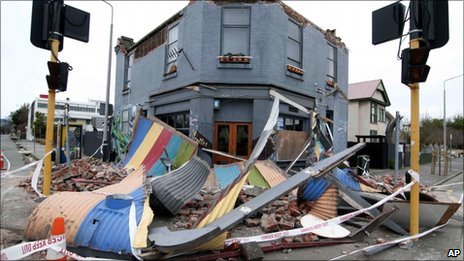 Officials in New Zealand have been evaluating the damage caused in the city of Christchurch by an earthquake and its many aftershocks.
Officials in New Zealand have been evaluating the damage caused in the city of Christchurch by an earthquake and its many aftershocks.
Prime Minister John Key said at least 90 buildings suffered significant damage and many of them would probably have to be knocked down.
An overnight curfew has been lifted, but the centre of the city remains cordoned off, Radio New Zealand said.
Mr Key said a storm heading towards the city could cause further damage.
The mayor of the city, Bob Parker, described the damage as immense, and a state of emergency has been declared.
He said it was an "absolute miracle" that no-one had died.
There are thousands of earthquakes in New Zealand every year but very few do any damage.
Under the table
The earthquake struck New Zealand's South Island in the early hours of Saturday morning, when most people were asleep.
The epicentre was 20km (13 miles) west of Christchurch, according to New Zealand's government-owned research organisation GNS Science.
New Zealand's Civil Defence estimated that more than 500 buildings had been damaged in the region.
Power has largely been restored in Christchurch, but large parts of the city still have no running water.
Those with running water have been warned not to drink it because of contamination from broken sewage pipes.
"You have to boil your water very carefully," resident Oriana Toasland told the BBC. "You're not allowed to flush the toilet because there's problems with the sewers. So we don't know how long this is going to go on for as well."
During the night following the earthquake, 19 aftershocks were reported by the GeoNet website.
One family in Darfield, near the epicentre of the quake, reported spending the night under their dining table.
Two men were seriously injured by falling masonry and glass, but there have been no reports of fatalities.
New Zealand lies at the southern end of the so-called Pacific Ring of Fire, and above an area of the Earth's crust where the Pacific Plate converges with the Indo-Australian Plate.
The country experiences more than 14,000 earthquakes a year, of which only around 20 have a magnitude in excess of 5.0.
The last fatal earthquake was in 1968, when a 7.1-magnitude tremor killed three people on the South Island's western coast.



